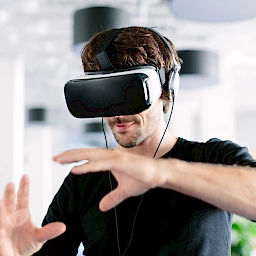The digital transformation is proceeding apace and making an impact on diverse areas of the world of work. The editorial office of the IBA Forum had a conversation with Dr. Sylke Piéch, an expert on artificial intelligence in the context of leadership, work and education.
Dr. Piéch, digital skills are among the key qualifications that will be needed in the future world of work. How can employees prepare themselves for the increasingly digitalized world of work?
The key digital qualifications include the ability to systematically handle data, to collaborate and to learn digitally, for example using digital media. As a result, employees are very specifically required to engage with the process of digitalization. Continuing education is the catchword. Many high-quality online courses and online tutorials are available. A number of platforms for teaching important digital skills have been created recently. The AI Campus, the learning platform for artificial intelligence, offers free courses, for example for enhancing the participants’ digital and AI skills.
Please also read

In your opinion, what are the relevant key qualifications for digital collaboration?
Digital and professional skills are important basic elements for human-machine collaboration. The focus is also on skills related to communication, teamwork and networking. Developing vocational skills is also important. In the digitalized world of work, employees need a new methodological setting. Especially when they are collaborating in hybrid team constellations with digital assistance systems and robots that function as new employees, they need methodological skills and know-how so that they can design this new kind of interaction.
Self-competence is another important aspect of the digitalized world of work. The goal here is for employees to select the right data from the wide spectrum of information and to take good care of themselves in the process. Health management and self-care will become even more important in the future.
What changes will the use of digital media and AI systems bring in the areas of human resource management and team management? And what effects will it have on corporate culture?
Digital collaboration requires clear rules and parameters and, above all, more transparency, ethical standards and stronger involvement of the employees themselves. For example, it’s important to have open communication about the expectations regarding collaboration and attainability, so that greater flexibility is not gained at the cost of personal health. If hybrid collaboration is to work, it also requires a redistribution of roles within teams. Which tasks will be carried out by human beings and which ones will be assigned to the AI assistance system? Continuing education and the development of individual talent are also becoming more important within organizations. Human beings functioning as the controlling and regulating authorities of AI systems — that can work only if the human beings in question have the required qualifications. But management work will also change. The management of hybrid teams presents completely new challenges and requires a different set of leadership skills.
Of course hybrid collaboration also has an effect on the culture of a company. A new discussion of values is needed in many companies and institutions. Transparency, trust, appreciation in collaborative situations and a constructive culture of learning from mistakes are central factors in such a discussion. That’s the only way to lay a foundation for the creativity and innovation that is needed during the process of change toward a digitalized, hybrid world of work.
What advantages does the use of artificial intelligence bring for managers?
One important area of application for AI systems for managers is human resource development. By using AI tools, one can effectively assess whether specific tasks are in the employees’ preferred fields or whether other tasks would be a better fit for their skill sets. The better the fit, the greater is their intrinsic motivation and readiness to learn the ropes faster and with a different kind of interest. The use of AI-supported skills profiles enables companies to make personnel development programmes more individualized and to prepare more efficiently for personnel development reviews. Managers can also use AI systems to analyse data, learn about certain dynamics and strategies faster and thus receive good support for their decision-making. And we shouldn’t forget the areas of communication, documentation and project management.
„In view of the skills shortage, it’s vital to keep an eye on each employee’s talents and to occupy them according to their preferences and skill sets. However, the search for talent should become not merely a search for the best workers but rather the creation of working conditions in which each employee is motivated to do his or her best. The focus on each individual’s strengths and the development of individual talent are crucial for companies’ competitiveness and innovative strength. That’s why it’s important to strengthen managers accordingly. They are the multipliers, and they are important for the implementation of the digital transformation in the world of work.“ Dr Sylke Piéch
How should we imagine the world of work in 2050? Will the physical office still exist in the future? And how will co-workers interact?
In the future, hybrid collaboration will continue to gain in importance. Meeting co-workers face to face — in other words, working in an office — will continue to be important for collaboration and the direct experience of a corporate culture. At the same time, many employees want to have temporal and spatial flexibility in the way their work is organized. There will be new virtual spaces that enable employees to collaborate in the metaverse, but these virtual spaces will coexist with the physical office. I think that in the future there will be a good mix of physical and digital spaces that enable us to learn from one another, share knowledge and create networks for ourselves.
„The digital transformation harbours added value and opportunities. These should be identified and utilized in the world of work. But the focus should also be on the question of where to stop. We need to protect our values and treat AI systems critically whilst nonetheless dealing openly with new developments. Balance is important — in other words, keeping up with new developments but also finding the right way to deal with AI technology and digitalization.“ Dr Sylke Piéch
Dr. Piéch, thank you for this interview.





